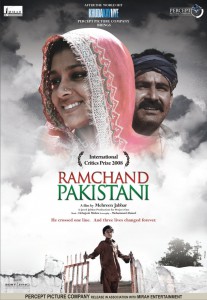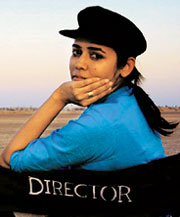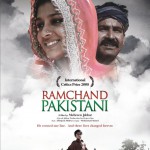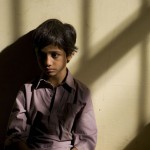 Little Pakistani boy Ramchand, distraught after a fight, crosses the heavily guarded border between Pakistan and India, and ends up in Indian captivity, along with his father, who went looking for him. Since the two countries are not communicating, Ramchand is forced to spend part of his adolescence in prison. The film debut of major television director Mehreen Jabbar has won several awards at international festivals.
Little Pakistani boy Ramchand, distraught after a fight, crosses the heavily guarded border between Pakistan and India, and ends up in Indian captivity, along with his father, who went looking for him. Since the two countries are not communicating, Ramchand is forced to spend part of his adolescence in prison. The film debut of major television director Mehreen Jabbar has won several awards at international festivals.
Trailer s anglickými titulky.
2008 – 103 min – drama
Directed by: Mehreen Jabbar
Cast: Shaood Alvi, Adarsh Ayaz, Atif Badar
Language: Urdu, Hindi
Subtitles: Czech, English
Format: DVD
Pakistan and India share a common culture and history, but ever since the two countries were created by dividing the colonial British Raj, their relationship at the political level has been fluctuating between suspicion and open hostility. In the background of this antagonism is a clash of conflicting political visions on the postcolonial arrangement of the Indian subcontinent, bloody clashes that accompanied the separation process itself, disputes over the territory of the former State of Kashmir, and attacks by terrorists based in Pakistan. The nearly three thousand kilometers Indo-Pakistani border is one of the best kept and most dangerous places of the world and has only one road crossing. Many people, however, cross it illegally – some with malicious intent, some accidentally, and some only in the desire to meet with family members, who were given the other country’s citizenship after 1947.
Inspired by true events, Ramchand Pakistani is set in an extremely tense period that followed the terrorist attack on the Indian Parliament building in 2001. Both countries had moved a large number of soldiers to the border and were ready for war.
The main characters come from a poor Hindu Dalit community living at the Pakistani border, who don’t know much about the political issues. Little Ramchand thoughtlessly crosses the border in a fit of anger and his father goes searching for him. When neither of them comes back, the fact they belong to the Hindu minority immediately casts a shadow of suspicion on them. Pakistani Muslims speculate that perhaps they were Indian agents, who returned home after their mission ended. While the Indian Army suspects them of spying for Pakistan.
Director Mehreeb Jabbar focuses on the inertia of the administration in both countries (although one scene suggests that the Pakistani side is more interested in resolving the situation than India) and the individual fates of the prisoners and parts of the prison staff. She shows how Ramchand changes within a few years in the prison from a taciturn and frightened child to an assertive and sharp lad. She also displays the strong character of Ramchand’s mother (played by famous Indian actress, director and philanthropist Nandita Das), who has no news of her husband and son and patiently refuses offers of other men, although in a patriarchal society, life without male support is an existential threat.
The film is shot on digital camera and its style fluctuates between raw documentary and poetically composed images.
Author: Miroslav Libicher
About the director
 Mehreen is a 16 year veteran of the industry, with a prolific career as Director/Producer of gritty, hard-hitting films for Pakistani Television. She began her career in television with TV films and drama series/serials, before turning to cinema, working as a freelance director for a number of TV channels and production houses in Pakistan, in addition to making a number of short films which have aired in festivals worldwide. Her award-winning short films and TV dramas include ‘Daughters of the Late Colonel’, ‘Beauty Parlor’, ‘Laal Baig (Cockroach), ‘Harjai’ (Betrayal) and ‘Doraha’ (Crossroads). Mehreen has been a member of the National Board of Film Censors in Karachi, a founding member of WAR (War Against Rape), the KaraFilm Festival in Karachi, has served as a juror at the Leeds International Film Festival in 2002 and was the Artistic Director at the Maisha Film Lab in Uganda, a non-profit training lab founded by director Mira Nair. She is also part of the advisory board of SAAMPT (The South Asian Academy of Motion Picture Arts and Television).
Mehreen is a 16 year veteran of the industry, with a prolific career as Director/Producer of gritty, hard-hitting films for Pakistani Television. She began her career in television with TV films and drama series/serials, before turning to cinema, working as a freelance director for a number of TV channels and production houses in Pakistan, in addition to making a number of short films which have aired in festivals worldwide. Her award-winning short films and TV dramas include ‘Daughters of the Late Colonel’, ‘Beauty Parlor’, ‘Laal Baig (Cockroach), ‘Harjai’ (Betrayal) and ‘Doraha’ (Crossroads). Mehreen has been a member of the National Board of Film Censors in Karachi, a founding member of WAR (War Against Rape), the KaraFilm Festival in Karachi, has served as a juror at the Leeds International Film Festival in 2002 and was the Artistic Director at the Maisha Film Lab in Uganda, a non-profit training lab founded by director Mira Nair. She is also part of the advisory board of SAAMPT (The South Asian Academy of Motion Picture Arts and Television).







